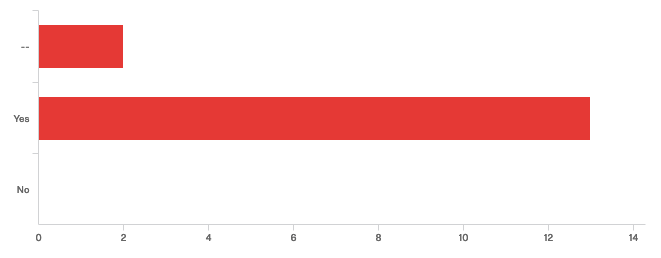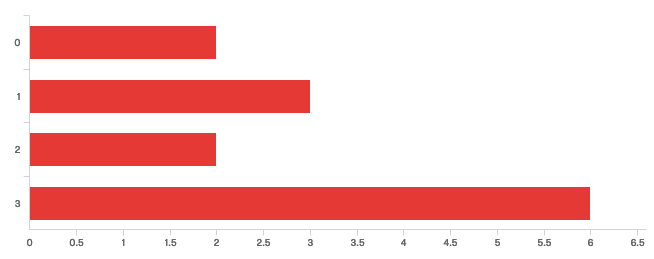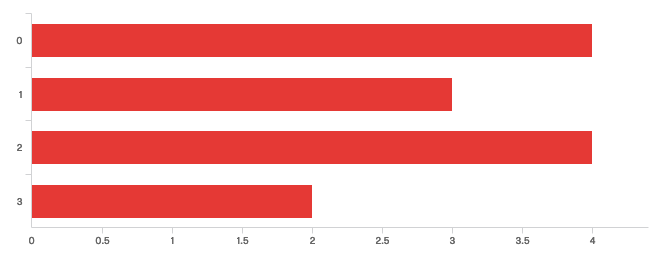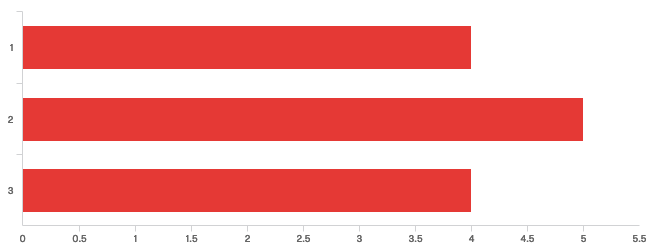![]()
In May, 2019, we asked the ASTeRIX community to complete an on-line questionnaire in order to understand better the community’s research interests and to survey scholar-artists with respect to proposals for the future development of the centre, Art, Sound, & TEchnology Research IntersecXions (ASTeRIX), which is a Type B Research Centre in the Faculty of Fine Arts at the University of Lethbridge. It supports research-creation across all departments in the Faculty of Fine Arts and includes, but is not limited to, investigating the intersections of technology and the arts. The remainder of this document includes results from the questionnaire and provides a report of the community members’ responses.
We wish to express our strong appreciation to the members who provided feedback via the questionnaire.
Participants
20 Participants responded to nearly every question
11 Participants viewed the questionnaire, but did not respond
Question
Would you support any of these topics as the basis for a central research and creation theme for 2019/2020?
Artistic agency and ethics in the digital age
An emergence of frictions in arts-based projects
Mediating experience and the senses during creation
Response from 15 participants
no response (13%)
yes (87%)

Question
Rank these three topics from most favourable (3) to least favourable (1). Type zero ( 0 ) if you neither approve nor disapprove.
Response from 13 participants
(1) Artistic agency and ethics in the digital age
0 neither approve nor disapprove (15%)
1 least favorable (23%)
2 (15%)
3 most favourable (46%)

(2) An emergence of frictions in arts-based projects
0 neither approve nor disapprove (31%)
1 least favorable (23%)
2 (31%)
3 most favourable (15%)

(3) Mediating experience and the senses during creation
0 neither approve nor disapprove (0%)
1 least favorable (31%)
2 (38%)
3 most favourable (31%)%)

Question
If you wish, please propose other topics for a central theme for 2019/2020 and beyond.
Response
(in the order received)
Voicing Silence: Text into Sound
Instead of Mediating the Senses During Creation, how about Mediating the Senses Through Creation
Art and Ecology Materiality Beyond the Anthropocene and Beyond Human Haunted Technology
Art, Politics and Digital Creation
The Emergence of Aboriginal Voices in Concert Music and Digital Music/Art
Intersections of the Digital and the Analog: New Art with Old Technology
Loops & cycles (looping, sampling, repetition, the seasons, circle of life, déjà vu, algorithms, etc.), as represented in various media, theories, and histories
Question
What ideas, concepts, areas of discussion or projects do you think would be suitable topics for gatherings? Ideas can be as general as, say, collaboration or collaborative writing, to more specific areas that relate to developing a research and creation framework for an upcoming event, installation, performance, exhibit, literary dissemination, etc..
Response
(ideas generally ordered by commonalities, followed by more singular ideas)
Teaching synergies (continuities, commonalities, areas of overlap). How can we share and augment each other’s teaching activities, potentially addressing any “gaps”?
Talking about collaboration among students and faculty across ASTeRIX themes/disciplines and as a part of curricula
Loops (looping, sampling, repetition, the seasons, circle of life, déjà vu, algorithms, etc.), as represented in various media, theories, and histories, and as part of curricula development
An extended/continuing collaborative visual art project: wall drawing installation, primarily involving student participants and developed as part of a curriculum, as well as targeting the SAB – visually, conceptually, functionally (as a shared space with community / research intersections)
Collaborative performance art event involving installations and collective writing
Moving poetry or text into sound performance
Supporting, and providing the means for, artistic production by minorities and under-represented groups
Workshop on Indigenous gaming (game themes: comic, sci-fi), led by a visiting scholar-artist
Exploring the different approaches to research and creation, especially with the goal of learning from one another
Surveying the breadth of interpretation, and language, of “research and creation”
Last year I was on a conference programme committee and reviewed three abstracts that delved into research-creation. One of the discussions we had as a committee was around the concept of research-creation itself, since the abstracts presented an understanding different from our own of what research-creation means. As a committee, we decided to accept the abstracts as a way to expand how we thought of, or start a further conversation about, the topic. I am coming into this group very late, but I wonder if it would be worth looking closely at some examples of research-creation to better understand its breadth?
Schedule Gatherings as Event + Discussions. Members present (e.g., a performance, audition production excerpts, etc.) + short research talk, with a focus on launching/generating future discussions and collaborations
These events would fill a gap in our faculty as we barely know what our colleagues do.
Making time: exploring strategies for finding time to share our research-creation (technology, practices, philosophy, techniques, directions, etc.) with each other and develop future collaborations – explored and actualised via a Hackathon in the Switch Lab.
Communities of Practice: a social theory of collaborative learning, helping us to possibly structure, and bring to light, benefits of multiple disciplines working together
Developing and identifying an audience on-line (e.g., a niche audience/market)
Microaggressions in the audio recording studio
Non-monetary forms of labour in the cultural production process
Trans-disciplinary working group and think tank, meeting to explore a series of questions in order to promote dialogue and exchange, on the topic of: the artist’s role in cultural rituals (traditional and secular) surrounding the experience of death, dying and memorial practices. Establish a foundation for a conference on this topic at ULethbridge.
Aligning ASTeRIX activities with other exhibitions, programmes, and events local (SAAG), national, international
Question
ASTERIX would like to develop a workshop series, entitled Intersections, for interdisciplinary research and creation for students, including both undergraduate and graduate students. In addition to hands-on activities, this series could include, for example, project development and dissemination strategies and leading students toward exhibiting at Crossing Boundaries 2020, 2021, etc..
What workshop ideas, concepts, areas of discussion or projects do you think would be appropriate? In addition, what constraints might you envision as part of the series (technical requirements, space requirements, duration, time of year, estimated costs for students if any)?
Response
(in the order received)
Site-specific performances, installations, etc., connecting bodily movement, sound and digital technology
Keep it simple and contained
Workshop on video essay making
Indigenous graphic and futurist art – from art-making to game to installation. Allow for multiple forms of expression.
Interpreting Sol Lewitt’s drawing concepts (Example: Sol LeWitt’s influential wall drawings around the world)
Browsing Internet Yami-Ichi, created by IDPW
Workshop on concept of “loops” (looping, sampling, repetition, the seasons, circle of life, déjà vu, algorithms, etc.), as represented in various media, theories, and histories, and as part of curricula development
Bio-signal / bio-data artistic practices with a focus on technology (sensors, hardware and software development)
An Intersections Workshop series specifically designed for faculty (or might take the form of a Gathering activity), including:
• Fabrication and prototyping techniques
• Programming (e.g., Processing, Max, Pure Data, and other DSP [Digital Signal Processing] applications)
• Working with microprocessors and other peripheral devices, including sensor-based technology
• Audio sampling and microphone techniques
Revenue generation from the creation of new works (new intellectual property), led by guest speaker.
There is an intellectual property lawyer in Lethbridge now – one of very few in Canada
